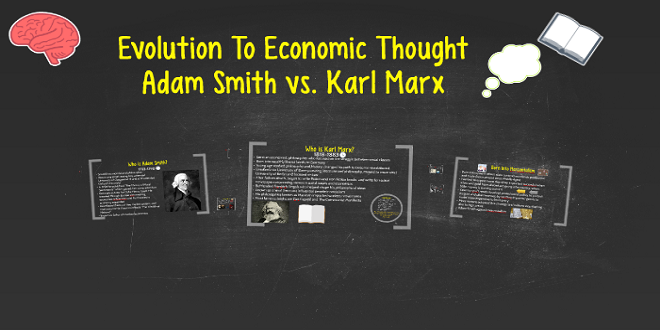From Adam Smith to Karl Marx: What would digitalization mean for ‘age’?

The world is becoming increasingly digital. Our lifelong earnings, relationships and property, as well as our personal rights, are all stored in a cloud-based server. The current political, economic, and social narratives about the depth and breadth digitalisation are overwhelmingly positive. Public funds are diverted to re-organize education, markets, governance, and digital industrial requirements. Digitalisation has made the world more flat and easier to access information. It also created many jobs and makes governments more accountable. The internet and digitalisation have made governance simpler and reduced information asymmetry.
These opportunities have led to a new generation in entrepreneurs and a new class for the rich. Social rights activists call for the internet and digital space to be more open, accessible, democratic, and free from regulations. Markets, the public sector, and the social sector (schools, universities) encourage digital technology, digital information, and the internet. How our social networks respond or share via social media can influence how we view and feel about social and political issues.
Although the benefits seem to outweigh the risks, it is important to critically consider the risks and dangers that increased digitalization poses to vulnerable people, social orders, and nations [i]. The potential for AI-driven digitalization to increase vulnerability of marginalised people and negatively impact labour markets, job security, wages, and employment is at risk. It can increase the risk of misappropriation digitally-assets like bank accounts or personal data[ii]. This opinion piece discusses the current state in “informed confusion”[iii]. It contextualizes how the world has changed since Adam Smith’s free market (1770s)[iv] and Karl Marx’s collective production (1870s][v].
Markets, the public sector, and social sectors (schools, universities, and schools) encourage digital technology, digital information, and the internet.
Adam Smith’s Wealth of the Nations theory and the invisible hand theory were written in the late 18th century, when international trade was growing rapidly and the colonial power of the United Kingdom was expanding. Smith believed that markets operate in perfect harmony when there is little government intervention. This book was written in the midst of the industrial revolution, when the average English citizen wanted the freedom to create, innovate, and produce. This was also when average English citizens’ per capita income was at an all-time high. This was also the time when wealth began to shift away from the land-owning classes, and it gave rise to the new entrepreneurs (neuveou riches) of the time. It is important to understand the situation of an average English citizen without any land, job, or education.
Her future would be dependent on the landlords. It is important to remember that the Industrial boom made it possible for working-class people to dream of becoming entrepreneurs, free-spirited, and wealthy. If they were able to get financing and open a factory that makes everything from diapers to biscuits and cloths to locomotives, then this was a golden opportunity. Imagine the discomfort the ruling class felt when their power over the landless was diminished after the industrial revolution. To maintain the current socio-political status, the state must have been forced to regulate international trade and industries. This is why we hold the greatest respect for the nation’s wealth. It gave us a rhetorical and philosophical weapon to challenge the state’s regulation. Wealth and prestige were accumulated by the first entrepreneurs of 18 th century Great Britain.
Like the IR of 18 th centuries, the digital age today began in the 1970s and continues to produce a aspirational middle class. This digital age, like the first IR has created new opportunities and challenged the ‘old money’ establishment through innovation in technology. Working-class people with ideas and skills can challenge capitalist establishments from established industries by discovering new digital wormholes for doing business. The status quo of the older generation’s institutions, rules, and routines is being challenged. Social media has challenged traditional media such as television and print media. SEO-based algorithms have challenging traditional brick and mortar marketing. Public policy work is affected by comments, likes and dislikes on social 2.0 and 3.0 platforms like youtube and twitter. The digital space was the birthplace of today’s most successful individuals and innovative businesses.
Karl Marx published Das Capital almost 100 years after the publication of Wealth of the Nations. Karl Marx’s ideas were in direct contradiction to Adam Smith’s political economy. Adam Smith advocated freedom, liberty, and no government intervention. Karl Marx, however, advocated collective production and shared interests. What context must it have been? This was the age of the post-industrial revolution. Cities had become a powerful force. Large-scale migration to cities had once again produced two classes: those who could produce and those who were able to survive.
One might ask, “How can means and organization of production change so that class differences are minimal?” Karl Marx, who probably developed around the Hegelian counterfactuals and re-imagined his ‘power center’ as the producer. He also envisioned it as the owner, regulator, and owner. Marx’s writings are a reflection of an era when capitalism was booming and social inequalities were rampant. His ideas and works provided the philosophical foundation to challenge the current system of production regulation and governance. Vox populi advocated greater income distribution and decision-making at both the production and governance levels.
Karl Marx’s writings defended the idea of a classless society. His writings included detailed discussions about organisational design as well as the role of the nation state’s public sector development. Over time, the idea of a classless society became more popular. Tensions between those with capital and those without it eventually led to many social and political protests, some of which resulted in regime change and bloody revolutions. The 1917 Russian Revolution is the most notable example of Karl Marx’s writings being institutionalized into the post-revolution soviet republic.
They may even be able to occupy the same political-economic space.
Digitalization is becoming more prominent and the state is providing greater support for social, market and state organizations. However, we face severe challenges. “The concentration and globalization of wealth, the persistence of unemployment, and the lowering wages have all become troubling once more” [vi]. Recent accusations about social media’s influence on politics, governance, and other decisions are seriously undermining state institutions and functioning [vii]. How much one spends on social-media algorithms and influencers is what will affect the market. There is less space available for emerging and new brands. Big click-based retailers are increasing their brand awareness and undermining small, upcoming entrepreneurs’ brands. We might see the gap between state and digital companies shrinking, as was the case with Karl Marx. They may even be able to occupy the same politicoeconomic space. Digital technologies are used to increase the vulnerability and fears of minorities. Similar to the writings and subsequent political changes of Karl Marx, digitalization may lead to similar events.
Last word
Mark Twain and many other philosophers believed that history repeats itself. We believe we are at a similar crossroads, where events that led to hyper nationalism and totalitarianism may once again take place. Hyper often precedes bloody struggles, and deep institutional changes. Digitalization, centralisation of data storage in the control of few companies and ownership of financial and personal data in the sole hands of a few, is therefore critical.




